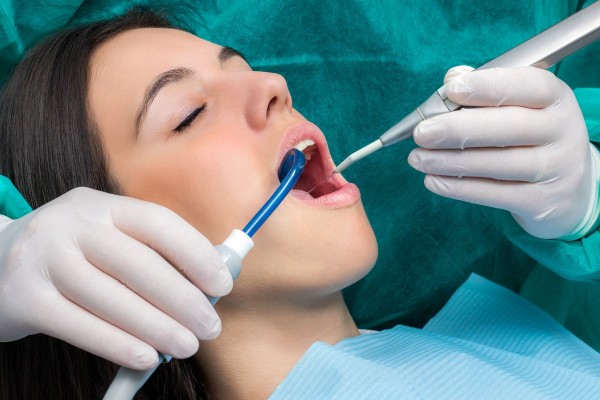If you are preparing to undergo treatment for cancer, you likely are aware you may experience a variety of unwelcome side effects. One you might not expect is the possibility of changes to your oral health. It’s estimated that a full one-third of patients being treated for cancer experience side effects in their mouth, teeth, and jaw region.
Common cancer treatments such as radiation and chemotherapy can affect patients orally for several reasons: In addition to targeting diseased cells, they can also affect healthy cells—such as those in your mouth, resulting in sores and infection which may make eating, drinking, and even talking difficult. They also can have detrimental affects on your salivary glands, leading to a dry mouth condition which in turn contributes to dental disease and decay. While all of this sounds unpleasant—and yet another consideration during what is already a stressful time—an oral care plan does not have to be complicated.
Steps for a Good Oral Health Care Plan Prior to Cancer Treatment
Prevention is an important first step. A good place to start is a visit to your oral health practitioner. This can be either your general dentist, or you can consult an oral surgeon, periodontist, or oral oncologist, depending on your specific condition. The physicians on your treatment team will be able to guide you if you need help.
Plan your oral/dental visit about four weeks before you begin cancer treatment. Your dentist or oral health practitioner will then have time to diagnose any problems, and take care of such things as treating any cavities or infections.
If you wear dentures, it’s important to make sure they are fitting correctly. The same goes for braces—your practitioner will most likely remove them so as not to risk irritation to your mouth. Should you require any oral surgery, you’ll need about two weeks to heal before proceeding with cancer treatments. It’s important that your oral practitioner is able to communicate with your oncology team prior to any treatments.
Oral Health Care During Cancer Treatment
Once you begin treatments, you will need to focus on the targeted care of your mouth and teeth. Practice good oral hygiene, including brushing twice a day and flossing. You can use an extra-soft bristle brush if you find your mouth is sore or tender. Soaking the brush in warm water will make the bristles even softer—and don’t hesitate to use a child-sized brush if a regular one is too uncomfortable. If you find that brushing or flossing makes your gums bleed, consult your doctor for advice.
You should also discuss with your dentist if fluoride products are appropriate in your case.
It’s important to rinse your mouth frequently, but avoid washes with alcohol, which can be too harsh. Dry mouth issues can be alleviated with lots of water and sugar-free drinks. Avoiding irritating foods and drinks such as sodas, alcohol and spicy dishes—and all tobacco should be practiced.
You may need a prescription for a medication that produces saliva, or a topical oral gel to alleviate irritation. Consult with your doctor.
Good Oral Health Care Following Completion of Cancer Treatment
When your cancer treatment is finished, you will still want to take special care of your oral health in the period following.
Dental issues may persist due to the effects of your treatment, so check in regularly with your dentist to scan for tooth decay and other problems.
Continue good habits such as brushing your teeth twice a day (don’t forget your tongue), flossing, and rinsing frequently with an alcohol-free mouthwash.
Maintaining a healthy, nutritious diet will help build your immune system. Avoid irritants such as tobacco and alcohol.
At Good Samaritan Dental Implant Institute, your oral health and medical needs are our first priorities. We are staffed with a first-class team and state-of-the-art facilities to help you plan your oral care prior to, during and following your cancer treatments. Please call for a consultation and let us assist you on your journey to complete wellness.


